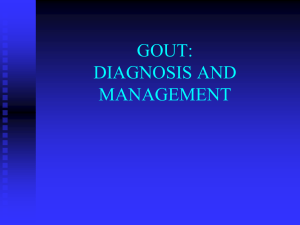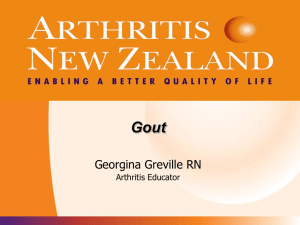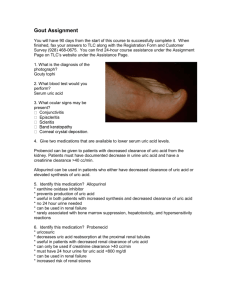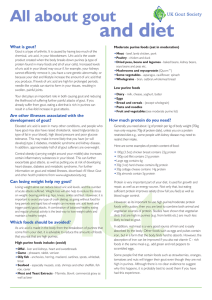script number 70 gout (one speaker)
advertisement
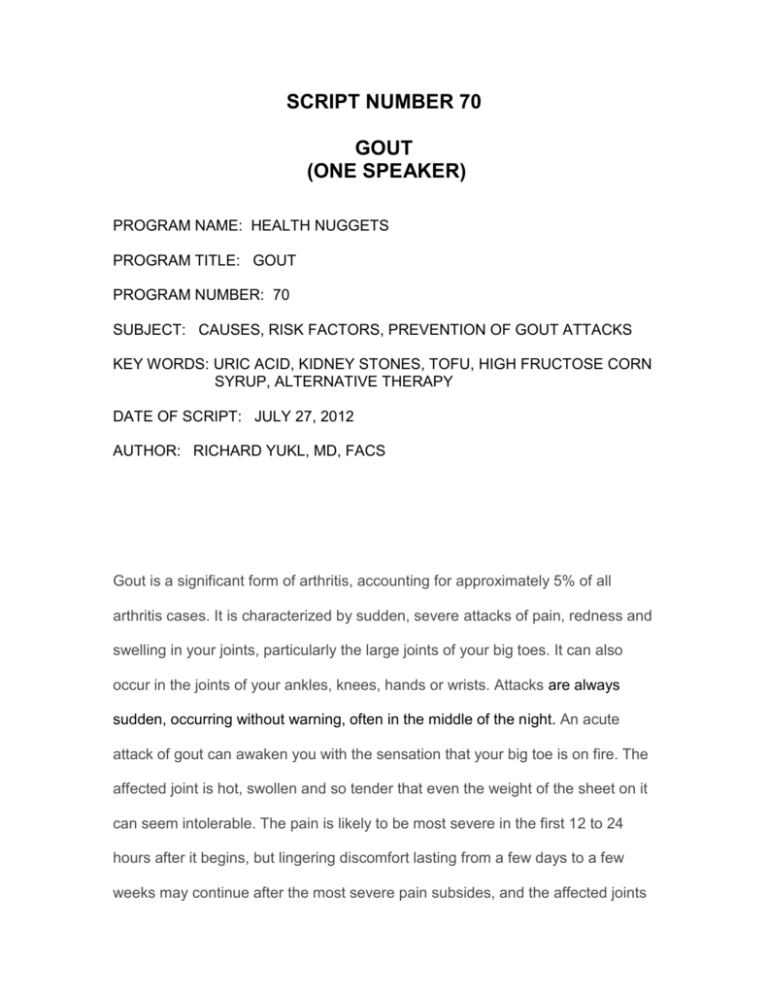
SCRIPT NUMBER 70 GOUT (ONE SPEAKER) PROGRAM NAME: HEALTH NUGGETS PROGRAM TITLE: GOUT PROGRAM NUMBER: 70 SUBJECT: CAUSES, RISK FACTORS, PREVENTION OF GOUT ATTACKS KEY WORDS: URIC ACID, KIDNEY STONES, TOFU, HIGH FRUCTOSE CORN SYRUP, ALTERNATIVE THERAPY DATE OF SCRIPT: JULY 27, 2012 AUTHOR: RICHARD YUKL, MD, FACS Gout is a significant form of arthritis, accounting for approximately 5% of all arthritis cases. It is characterized by sudden, severe attacks of pain, redness and swelling in your joints, particularly the large joints of your big toes. It can also occur in the joints of your ankles, knees, hands or wrists. Attacks are always sudden, occurring without warning, often in the middle of the night. An acute attack of gout can awaken you with the sensation that your big toe is on fire. The affected joint is hot, swollen and so tender that even the weight of the sheet on it can seem intolerable. The pain is likely to be most severe in the first 12 to 24 hours after it begins, but lingering discomfort lasting from a few days to a few weeks may continue after the most severe pain subsides, and the affected joints will remain swollen, tender and red. Your liver produces uric acid when it breaks down certain of the foods you have eaten, foods such as red meat, especially liver, sea food such as anchovies or herring, and other foods such as asparagus, mushrooms and red wine. Normally, this uric acid dissolves in your blood and passes through your kidneys into your urine. If, however, your body produces too much uric acid or your kidneys are unable to filter it fast enough, the uric acid levels in your blood build up, forming crystals. Gout is caused by the buildup of uric acid crystals in your joints. These crystals are sharp and needle-like. They settle in your joints or surrounding tissues, and there they cause the pain, inflammation, stiffness and swelling. What you eat is the most important factor relating to gout attacks. Factors that will increase your uric acid level other than your diet include lifestyle factors such as drinking excessive alcohol. More than two drinks a day for men, and more than one a day for a woman, has been shown to increase the risk of gout attacks. Also, some diseases and conditions increase your risk. These include untreated high blood pressure, high fat and cholesterol levels in your blood, arteries narrowed by cholesterol plaque, and chronic conditions such as diabetes. If other members of your family have had gout attacks, you are at an increased risk as well, because a genetic abnormality causes the liver of people in some families to overproduce uric acid. Female hormones protect women against suffering gout attacks because female hormones help to filter uric acid from the blood into the urine. As women age, however, their levels of female hormones decrease with menopause, and they become increasingly susceptible to attacks. People with gout are prone to have multiple attacks. Left untreated, uric acid crystals will eventually form under the skin where they will become swollen and tender during gout attacks. Collections of these crystals can also accumulate in your kidneys and urinary tract, causing kidney stones. What should you do if you awaken with an acute gout attack? Your doctor will prescribe certain powerful medicines to decrease the inflammation and pain, medicines to block the production of uric acid by your liver, and other medicines to improve your kidney’s ability to filter uric acid from your blood. Some changes in your diet and lifestyle can be helpful. The American Dietetic Association has guidelines that you can follow at home during an attack. Drink 8 to 16 cups of fluid a day. That’s 2 to 4 liters of fluids every day, with at least half of that volume being water. Avoid drinking alcohol. Decrease the amount of protein you eat, and be sure that protein comes from healthy sources such as low-fat or fat-free milk products, tofu, and nut butters. Finally, limit your daily intake of meat, fish and chicken to 4 to 6 ounces, or 113 to 170 grams, per day. Eggs, by themselves, do not increase your risk of a gout attack. During symptom-free periods, there are dietary guidelines that may help protect you from suffering future gout attacks. First, keep your fluid intake high. Aim for 8 to 16 cups, or about 2 to 4 liters, of fluid each day, with at least half that volume being water. Limit how many sweetened beverages you drink, especially those drinks sweetened with high fructose corn syrup. Next, limit or avoid drinking alcohol. Recent evidence suggests that beer in particular increases your risk of a gout attack, especially in men. Importantly, eat a balanced diet. Your daily diet should emphasize fruits, vegetables, whole grains, and fat-free or low-fat milk products. Eating meat, fish and chicken is associated with increasing the likelihood of developing an acute gout attack, so limit your use of these foods. Finally, maintain a desirable body weight. Choose food portions that allow you to maintain a healthy weight. Losing weight will decrease uric acid levels in your body. If you diet to lose weight, however, avoid fasting or overly rapid weight loss, since such extreme changes may temporarily raise your uric acid level and your risk of an attack. If the gout treatments you try fail to relieve your gout pain as well as you'd hoped, talk to your doctor concerning alternative therapies. Unfortunately, there isn't a lot of research on alternative therapies for gout, so the risks may not be completely known. Alternative therapies that include relaxation techniques such as deep-breathing exercises and meditation may help take your mind off your pain. Eating cherries and other dark-colored fruits, such as blackberries, blueberries, purple grapes and raspberries have been associated with lower levels of uric acid in studies, and they may be a safe way to supplement your medical gout treatment. If you consider alternative therapies, discuss them with your doctor. Health Nuggets is written by Dr. Richard Yukl, a medical doctor working in the United States. The medical views expressed in this program are his and may differ for your particular health needs. If you need medical advice, please consult a medical professional in your area.
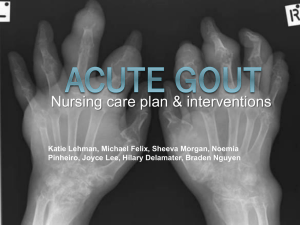
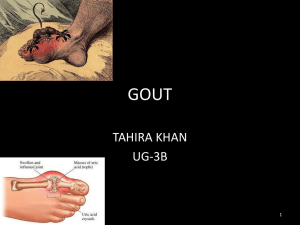
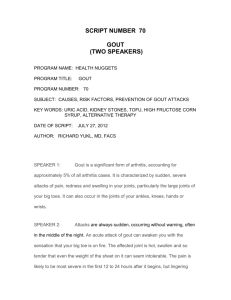
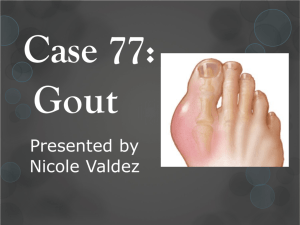
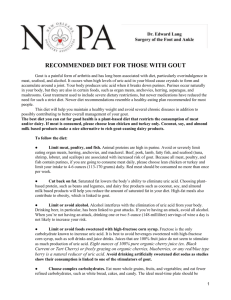
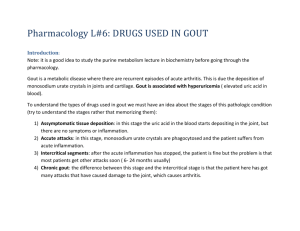
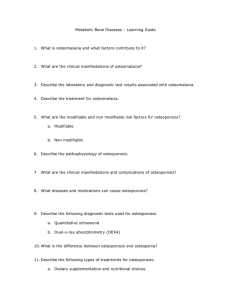
![06Gout_-_Copy[1].](http://s2.studylib.net/store/data/005758926_1-0d7c6513b0c82c14c18839741770ea53-300x300.png)
